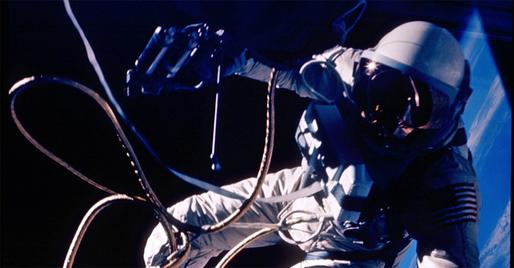
Spending some time in the cosmic vacuum—sans spacesuit—might seem like a questionable life choice. After all, in the movies, whenever people end up in the intergalactic void without proper protection either their heads explode or they instantaneously freeze solid. Neither outcome is particularly appealing.
However, in reality, I’m afraid that your space death won’t be quite so spectacularly gruesome (see: no exploding head or bulging eyeballs). But that doesn’t mean that your death won’t be interesting. Here are some of the ways space can kill you:
1.) EXPLOSIVE DECOMPRESSION:
Let’s assume that you’re in a space shuttle. You’re traveling along merrily. Your life is just grand. Suddenly, you’re seized with a completely irrational, yet entirely irresistible urge to go for a spacewalk. And (oops!) you forget your spacesuit. So the air doesn’t slowly leak out of your shuttle. You’re not gradually exposed to a complete vacuum. Oh no. You open the door of your pod and BAM!
Decompression. No air. You’re in space.
As long as you don’t try and hold your breath during this explosive decompression, you’ll survive about 30 seconds before you sustain any permanent injuries. But what if you do hold your breath? How likely is it that you would survive?

If you hold your breath during decompression, the gas in your lungs will expand due to the lack of ambient pressure. This expansion will eventually cause internal ruptures in your pulmonary tissue (essentially, your lungs will kind of, well, explode…for lack of a better description). As your lungs collapse (explode/tare) the gas that they contain will be transformed into massive, internal air bubbles. These bubbles will meander throughout your body. Sooner or later, they will find their way to your vital organs, such as your heart and your brain (which may not actually be a “vital organ,” depending on how intelligent you are).
If the air lodges in your heart you’ll go into cardiac arrest and die (essentially, you’ll have a heart attack). If it makes its way to your brain, you’ll have a massive stroke and die. Of course, even if the air from your exploded lungs does not enter your heart or your brain, you’ll still die. We simply don’t have the medical technology needed to repair lungs ruptured in this manner (alas).
So no matter what way you look at it, explosive decompression is very bad for your health.
2.) EBULLISM:
After about 10 seconds, the moisture in your body will start to evaporate. This is known as “ebullism,” and it happens because the reduction in pressure causes the boiling point of your bodily fluids to decrease. And if “evaporating body fluids” doesn’t sound terribly pleasant, well, it’s because it’s not. Trust us, we know from experience…

On August 16, 1960 Joe Kittinger ascended to 19.5 miles (31.3km) in an attempt to break the world record for the highest parachute jump. During his ascent, Kittinger noticed an odd sensation in his right hand. Upon inspection, he realized that he had lost pressurization in that area of his suit. Nonetheless, Kittinger decided to continue the mission as, fortunately, the rest of his suit seemed to be functioning properly. Thus, the only part of Kittinger’s body that was exposed to near-vacuum conditions was his hand.
As he continued to ascend, the fluid in Kittinger’s skin continued to evaporate. Eventually, this caused his hand to swell to over twice its normal size. Kittinger describe this experience by likening it to the tingling sensation you feel when your foot falls asleep…so thousands of tiny pinpricks, dancing across your skin. You might scoff at this, but the pain will virtually paralyze you.
Want to hear the really bad news? As the moisture in your body evaporates and trails off into the darkness of space you will lose control of you bodily functions—so you’ll simultaneously defecate, vomit, and urinate. Oh, and if you don’t return to your ship in about 30 seconds then ebullism will cause your lungs to collapse. And you will die. Not so fun times.
3.) FREEZING:
Fortunately, heat doesn’t transfer very quickly in the vacuum of space because there is no air, water, or other medium to aid the transfer of heat. This is obviously a very good thing, as space can be both frigidly cold and scorching hot. Fun fact: If you’re facing a sun-like star, and are about 93 million miles away (150 million km), the temperature difference between your “day” and “night” side will be about 275 degrees Fahrenheit (135 degrees Celsius). However, since heat does not transfer well in space, freezing to death is not an immediate risk…neither is spontaneously bursting into flames (yay!).
But just because freezing isn’t an immediate risk doesn’t mean that it’s not a risk.
Remember when we talked about your bodily fluids evaporating (I hope you do; it was only 2 seconds ago). Well, when your body fluids escape as a gas, they take away more than their fair share of heat. Eventually, this evaporative cooling will chill your mouth and nose to near-freezing temperatures; ice will also form in your respiratory tract. And of course, you’ll be radiating heat from your body. Stay in the vacuum too long and the combined effects of this cooling will lead you to an icy death.
4.) HIGH ENERGY PHOTONS:

If you’re close to starlight when you enter the vacuum of space, things will go poorly rather quickly (really though, why would you vacate your ship when you are close to a star?!? Terrible life choice). First, you’ll get an awful sunburn from the ultraviolet radiation. Unlike the Earth, the vacuum of space doesn’t have an atmosphere to protect you from harmful solar rays, so even short term exposure could cause cancer. But as long as you remain about 93 million miles (150 million km) from Sun-like stars, you’ll be fine (relatively speaking, of course).
Venture closer than that (why would you do that?!?) and the ultraviolet, X-ray, and gamma rays radiating from the star will cause severe damage to your DNA. And no, you won’t get super powers or turn into one of the X-men…you’ll get tumors and experience organ failure. Get too close to the star and you’ll start to fry from the extreme heat radiating from the star
5.) BURNING UP IN THE ATMOSPHERE:
But wait…how can you burn up in an atmosphere if you’re in the vacuum of space?
A fine question. Allow me to explain. But first, I need to point out that, when people tell you that there’s no gravity in space, they are lying (or, at the very least, promoting a nasty rumor). There is gravity everywhere—planets, stars, comets, asteroids, Home Depot, and even in the vacuum of space. Gravity envelops our own planet and the most remote corners of the universe. So you could be in the vacuum of space but, if your too close to a massive object (like a star, planet, or moon), gravity will cause you to fall into the object.
Ultimately, objects that are in orbit around another body don’t maintain their position because there is no gravity, but because of speed (as in velocity…not the drug). For example, objects in Earth orbit have to travel at least 17,500 mph to keep from plummeting to the planet (28,000 kmh). At this speed, an object is moving so fast that, as it falls towards the Earth, the planet curves away beneath it. Consequently, the object essentially remains in a state of free fall and the Earth never gets any closer.
But if you slow down, things start to get a bit mucky.
Although there is no clear-cut answer to where space truly begins, the consensus is that it starts somewhere around 400 miles (643 km) above sea level (give or take a little). So let’s say that you are traveling around the Earth at about this altitude when you decide to make your little foray into space. Since you are still subject to the Earth’s gravity, you won’t just fly about the planet for all eternity. You’ll burn. Eventually you will start to slow down and plummet into the Earth’s atmosphere…where you will be fried to a crisp. Actually, you’ll be fried to more than a crisp—you’ll be dusty nothingness. Of course, it would take some time for your orbital decay to be significant enough to result in a fiery death (about a decade, depending on your speed).
6.) ASPHYXIATION:
So what’s the most immediate threat that you need to worry about in the vacuum of space? Rogue black holes? Gamma ray bursts from distant quasars?? Aliens?!? I’m afraid it’s nothing quite as horrifyingly fantastical as all that.
The most immediate threat in the cosmic vacuum is oxygen deprivation. Assuming that you don’t hold your breath during decompression, it will take about 15 seconds for your O2 deprived blood to get to your brain. When this happens, you’ll pass out…and then you’ll die.Simple loss of oxygen will likely kill you faster than anything else in the vacuum of space.
Wonder what it would be like to live for one day on Phobos, the Martian moon? Or Titan, Saturn’s most glorious moon? Find out. Similarly, see how the act of sex differs in space, or see what would happen if you were sucked into a black hole.